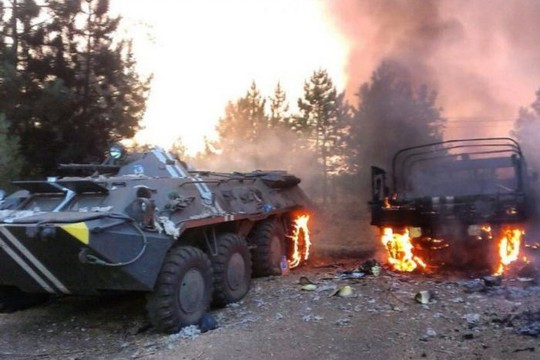Western military equipment destroyed during the counteroffensive of the Ukrainian army.
Presidents lie when it suits their purpose. Woodrow Wilson, Franklin Delano Roosevelt, and Lyndon B. Johnson all promised Americans that they would not send American boys to die in foreign wars. President Joe Biden, however, is arguably the first to make public predictions that invariably came true in reverse, writes Douglas Macgregor, Col. (ret.), the former advisor to the Secretary of Defense in the Trump administration, a decorated combat veteran.
Instead of deterring China, the Taiwanese electorate is likely to elect a new government that favors reunification with Beijing. Rather than collapsing the Russian economy, Biden’s proxy war is destroying the economically fragile European Union. Instead of realizing Francis Fukuyama’s “Rebirth of the West,” Washington’s policies are accelerating its decline. And instead of preventing the emergence of a new coalition or axis of illiberal powers — including Russia, China, India, Iran, Saudi Arabia and others — Washington has cemented these relationships to the detriment of Western interests.
Ukraine’s “spring” and now summer offensive operation is stalled, if not defeated. Exact numbers of Ukrainian dead and wounded are not yet available, but the number of Ukrainian soldiers killed in action in the latest onslaught reportedly number in the thousands, along with many more wounded. Tank and armored-fighting-vehicle losses have also been significant. Meanwhile, Russian losses in response to the offensive are reported to be relatively negligible, with Russian soldiers killed and wounded in action only in the hundreds.
Cracking deliberate defenses is so difficult, so time- and resource-consuming, that U.S. ground forces rarely practice it in peacetime, nor do U.S. Army officers study it in detail as Russian officers do.
Predictably, Ukrainian forces were compelled to attack under persistent Russian surveillance through the 15 to 25 kilometer security zone in front of Russia’s main defensive belts. Again and again, Russian forces in the security zone withdrew from forward outposts to prepared defensive positions just ahead of the main defensive belt. Ukrainians moved forward only to be crushed by artillery supported by Russian attack helicopters firing precision rockets from behind Russian lines that have a longer range than U.S. Hellfire missiles.
During the attacks, Ukrainian columns stumbled into minefields that canalized their movement into areas where a combination of massive drone and artillery strikes broke up the attacking formations. Meanwhile, Russian forces reportedly employed aerially delivered mines behind advancing Ukrainian forces. As a result, when attacking Ukrainian forces sought to disengage from the death traps and withdraw to their own lines, Russian forces employed loitering munitions to destroy the remaining Ukrainian troops stuck in minefields on all sides.
The question in Moscow: What happens next?
First, Moscow can attack to seize and secure either Odessa or Kharkov. Along with Kharkov, Odessa is one of the two historically Russian cities Moscow promised will be returned to Russian control. Aside from Odessa’s enormous strategic value in terms of cutting off Ukraine from the Black Sea, Odessa was also the scene of horrific atrocities committed against Russians during the Maidan Revolution. These events are still vivid in the Russian memory.
Two, once Odessa is seized, Moscow may well pause to see if Berlin or Paris will negotiate an end to the conflict. If there is no willingness to negotiate, Kharkov along with more of Eastern Ukraine will likely rapidly fall into Russian hands.
In Europe, the economic picture is grim, and European populations, especially the German people, are turning against Washington’s proxy war. The newest polls now place the Alternative for Germany (AFD) Party as the second-largest political force in German politics. Given P.M. Olaf Scholz’s suicidal policies of de-industrializing Germany and opening Germany’s borders to still more unwanted and unaffordable refugees and migrants, perhaps the AFD can put together a “coalition of the rational” to remove Scholz and negotiate with Moscow?
A short time ago, Poland’s leadership advocated for NATO intervention to fight shoulder to shoulder with Ukrainians against Russia. Now, Polish President Andrzej Duda says that the Russian steamroller is crushing Ukraine, with hundreds of Ukrainian soldiers dying on the front lines every day. Popular Polish support for Ukrainian refugees is also drying up.
Now is a good time to negotiate, because it is Washington, not Moscow, that needs an off-ramp from multiple disasters. The failed war in Ukraine, America’s weakening economy, rising nationwide criminality, and open borders crisis beg for decisive action, stresses Douglas Macgregor.
read more in our Telegram-channel https://t.me/The_International_Affairs

 10:00 17.06.2023 •
10:00 17.06.2023 •























